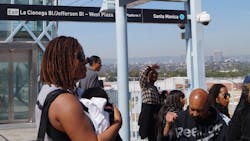L.A. Metro continues pursuit of innovative mobility initiatives to keep Los Angeles County moving
The Los Angeles County Metropolitan Transportation Authority (Metro), a sponsor of the CoMotion L.A. 2019 mobility conference, is continuing its pursuit of innovative urban mobility efforts to transform the congested L.A. region in the decades ahead.
With this year’s conference focused on the future of mobility, L.A. Metro is now pursuing a range of initiatives aimed at pushing the envelope to advance new mobility platforms, including the agency’s new Traffic Reduction Program, New Mobility Regional Roadmap and a gender-based transit equity study.
“We are reimagining Los Angeles County mobility in fundamental ways to address our daunting mobility needs,” said city of Inglewood Mayor and Metro Board Chair James Butts. “Metro has a clear strategic vision for getting there and will speed travel and improve the customer experience, increase travel options and release our county’s economic and social promise.”
First among these is L.A. Metro’s new Traffic Reduction Program, which seeks to introduce a package of transportation improvements, including more public transit services, affordable ride-sharing, carpooling and safer walking and bicycling options, coupled with congestion pricing strategies, as part of a pilot program to improve mobility in a congested area of L.A. County. This program emerged as part of L.A. Metro’s Vision 2028 Plan, a strategic roadmap for making mobility work for everyone in L.A. County in the next decade.
L.A. Metro recently awarded two contracts totaling more than $5.5 million for technical services and outreach to investigate the feasibility and framework for testing and implementing this Traffic Reduction Program. The study will actively seek public input to evaluate potential new transit services and other transportation options as well as various congestion pricing models. It will also identify a location for a potential pilot and establish an implementation plan with the goals of providing more travel options, improving equity and increasing environmental benefits.
L.A. Metro says the congestion pricing element of the Traffic Reduction Program has proven successful in mitigating congestion in other major cities worldwide, and many more cities are now considering this option. The Los Angeles region is in the position of being able to look at pricing as part of a holistic traffic reduction strategy.
Mobility is changing rapidly today, with a wealth of new providers such as ride-hailing, ride-sharing, scooter, bike share and courier network services entering the transportation market. L.A. Metro is working to help manage countywide interactions with these new mobility providers through its New Mobility Roadmap that is now under development. While each of these services provide increased access to opportunity and connections for users, they can also place additional burdens on the transportation system, adding to congestion, competing for pedestrian rights-of-way, conflicting with public transit, and creating new safety, security and equity concerns. L.A. Metro proposes to build a countywide coalition of city, county and other municipal partners to thoughtfully evaluate a range of legislative and regulatory strategies for transportation network companies and micro-mobility providers to address these issues. L.A. Metro plans to convene a series of working group meetings to further develop its roadmap and achieve regional consensus on the best path forward for managing these new providers.
L.A. Metro says it is also focused on achieving greater equity for all users on the transportation system. The agency has taken this issue one step further by recently completing a groundbreaking study titled “Understanding How Women Travel.” This study is an in-depth examination of how women and their children use the L.A. Metro system and the unique challenges they face daily. L.A. Metro says this is believed to be the first study of its kind conducted by a U.S. transit agency and it takes a look at how women — who make up more than half of L.A. Metro’s riders — experience the system. Results have revealed opportunities for L.A. Metro to make improvements in security and safety, service hours and even vehicle designs to address these challenges. L.A. Metro will use these results to develop a Gender Action Plan that will outline specific policy, operational and service improvements that could be put into action to help create a more equitable transit system.
“We are looking at all of our projects and programs through the lens of equity,” said Metro CEO Phillip A. Washington. “We must make sure that the transportation revolution we are now leading is equally available to all. Only then we will create equal access to opportunity for everyone to enjoy the world-class transportation system we are now building.”

